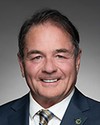Mr. Speaker, I am pleased to rise today to speak to Bill C-3 and the transformative power of Canadian citizenship. Fundamentally, this bill is about people from real families, as well as their history, their sacrifices and their deep and lasting ties with Canada, regardless of where their careers or lives take them.
In my role as an MP since 2015, I have had the opportunity to meet many families in my riding who were reunited through immigration. I did not experience that with my own family. The Lauzons in Notre‑Dame‑de‑la‑Paix, Petite‑Nation and Gatineau have no family ties with people in other nations. However, I have been able to learn about this through the cases that we have handled in my office and through the assistance that we have been able to provide to families. We have seen how important family reunification is.
Fundamentally, this bill is about people from real families. Citizenship is a legal status, of course, but more than that, it is about belonging to a diverse, welcoming community bound by shared democratic values. This is something that reaches across borders and, in an ideal world, we would be able to unite all families, but that is not possible. However, in today's interconnected world, where migration and mobility are facts of modern life in Canada, we have a chance, as Canadians, to lead by example and show the rest of the world how important family unification is.
While some countries are restricting access to citizenship, Canada is taking a more principled approach, one that embraces diversity, cross-border families and the lasting ties Canadians have abroad. Many Canadians live and work abroad in international development, the arts, culture, science, education, global commerce or humanitarian aid, to name a few. These citizens have their own deep ties to Canada, often returning here to raise their children, care for loved ones and create new communities. Ensuring that their children, whether born or adopted abroad, can share in this identity is not only a matter of fairness, it also strengthens our country's unity and global reach.
Today, I want to share with the House what new Canadians have told us about the importance of their citizenship, what they have told me since 2015. We have had conversations with new Canadian families about the importance of reuniting children and grandchildren, about the impact citizenship has had and about how we must continue to protect the rights, responsibilities and shared value of citizenship. Becoming a Canadian is a privilege, and it is often described as a source of great pride.
Our government carefully designed this bill to fill a gap that has existed since 2009. People are proud to call Canada their home and proud of the journey they took to get here. Becoming a Canadian citizen represents the culmination of years of sacrifice, hard work and perseverance, not only by individuals, but often by their entire families. A lot of compromises may have had to be made, sorely testing these families. Gaining citizenship is also a moment for connection and community, a chance to be part of something bigger than ourselves. Many members of the House have seen first-hand the emotional impact of this moment. Newcomers, often with their children by their side, hold their certificates with pride, knowing that their family's future is more secure here, in this wonderful country.
This sense of pride transcends borders. People all over the world would love the opportunity to make Canada their home. For those fleeing conflict, persecution or hardship, Canadian citizenship represents a fresh start, a new life, a second chance at life. Most people see it as a privilege and do not take it lightly. New citizens often express how profoundly grateful they are. People often talk about the opportunities that Canada has to offer, especially when it comes to education, health care and peace. These pillars of Canadian life are the cornerstones of a better future, not only for new citizens themselves, but also for their children and future generations.
Whether through volunteering, participating in local cultural events or simply getting to know their neighbours, new Canadians play an active role in strengthening the fabric of our society. They embody Canada's spirit of generosity and contribute to the success of their communities in many ways. We all have people like this in our lives today, especially as federal MPs in Ottawa.
As a government, we must remain vigilant to ensure that Canadian citizenship remains a symbol of inclusiveness, fairness and security, as well as a commitment to those values.
Why is Bill C‑3 important for me? It is the reason why we introduced this bill. It is to ensure that access to citizenship remains fair and transparent. At a time when disinformation and division can threaten confidence in public institutions, Canada must show that its commitment to fairness extends across borders.
Providing thoughtful and inclusive pathways to citizenship beyond the first generation affirms that Canadian identity is shaped not only by place of birth but also by connection, contribution and values. The government's role is not limited to protecting the rights of Canadian citizens. It must also clarify the citizenship process and pass laws that take equality and inclusion into account.
This bill aims to automatically remedy the status of individuals who would have been Canadians were it not for the first-generation limit. It also creates a forward-looking new framework for citizenship by descent. In the future, children born abroad beyond the first generation will be eligible for citizenship if their Canadian parent can demonstrate a substantial connection to Canada. In the future, as long as the Canadian parent who was born abroad spends a cumulative total of three years in Canada before the birth of their child, their child will also be born a citizen.
The objective and structure of the Citizenship Act have been that children adopted abroad by Canadians and children born abroad to Canadians are treated as similarly as possible, and this will continue to be the case after Bill C‑3 comes into force.
The great privilege of Canadian citizenship comes with great responsibility. It is a responsibility to engage, to contribute and to build on the values that make our country what it is. Citizenship is not just a destination. It is a journey and a commitment to community, justice and mutual respect.
In conclusion, Canadian citizenship is an important and emotional occasion. It is a privilege that comes with opportunities and gratitude, along with a responsibility to uphold the values that unite us. Citizenship is not just a legal matter. It is a reflection of who we are and who we include. By passing Bill C‑3, we are choosing connection over exclusion and fairness over restriction. We are telling Canadians around the world and their children that their ties to our country are important, that their history, their contribution and their sense of belonging are part of what makes Canada strong.















